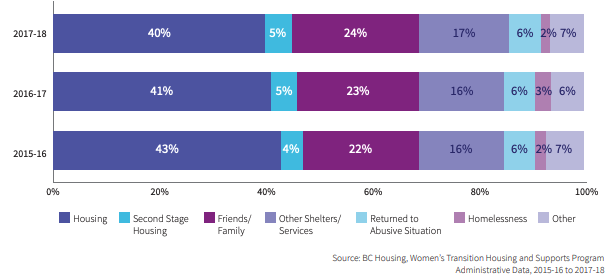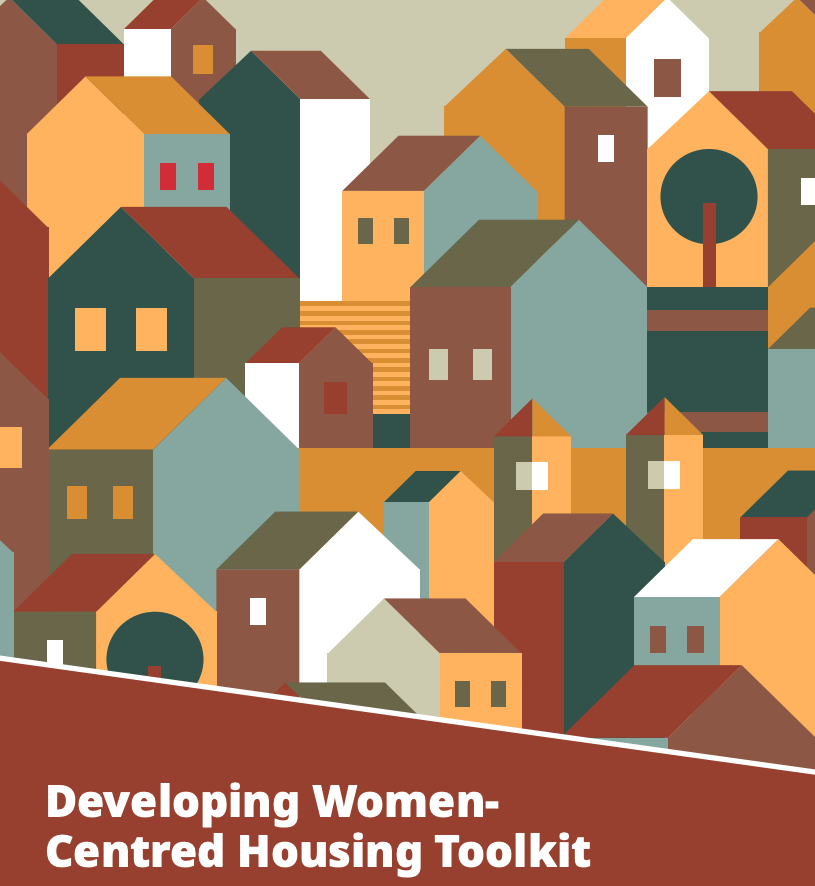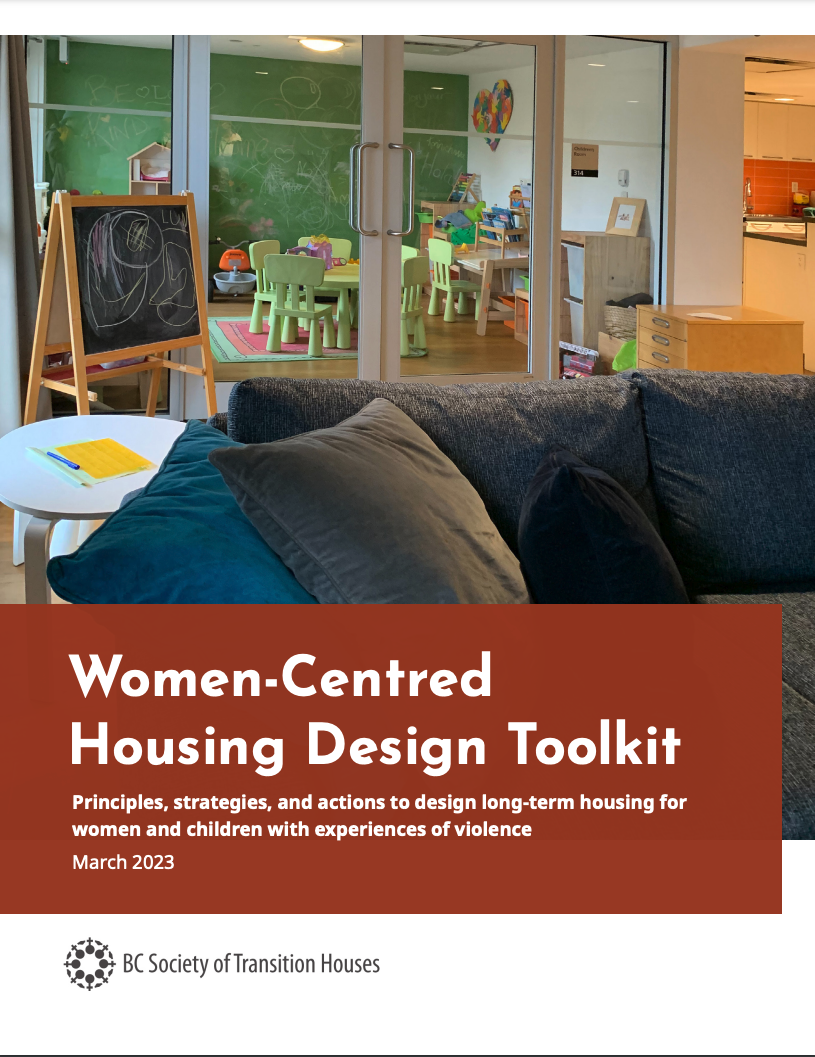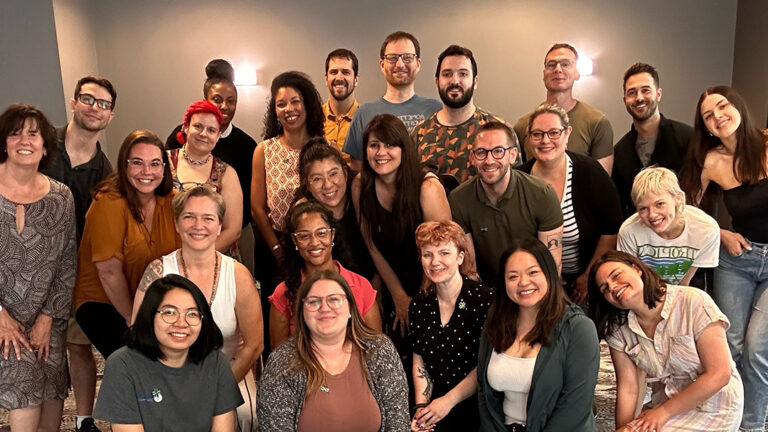Major barriers prevent abused women from accessing housing after experiencing trauma. The invisible nature of homelessness, often underestimated in women, affects many victims of violence, especially those with children. Structural barriers, such as the wage gap, hinders their search for housing and puts them under severe strain. Despite the assistance of support programs for those who are able to find accommodation in transition houses, an alarming bottleneck persists- preventing a smooth transition and creating a ripple effect across the entire continuum.
The situation is particularly alarming in British Columbia, where statistics from BC Housing reveal that only 4% of women leaving transition houses find affordable housing. The vast majority (75%) end up in precarious housing situations (family, shelters, etc.) or in homelessness. 6% return to the violent relationship they tried to escape.
Housing situation of women leaving transition houses in BC

Many women who are victims of violence have no access to affordable, stable housing after leaving a violent partner, which puts them in a precarious situation. Some of them return to the abusive relationship.
The province has adopted the “safe homes” model, offering short-term stays in isolated locations. However, the shortage of appropriate, affordable housing in the communities still exacerbates the situation. More housing of all types is needed, and it must meet the specific needs of people fleeing abusive relationships.
We met with Kaayla Ashlie of BC Society of Transition Houses (BCSTH) to discuss the organization’s work to transform this bleak reality.
The path to meeting housing needs for abused women
In 2018, British Columbia made a strategic shift when the provincial government earmarked more than $700 million for long term housing development in the anti-violence sector. Its goal is to build 1,500 spaces for women and children experiencing violence over the course of a decade.
This injection of funds promises a transformation that would not otherwise be possible. For Kaayla Ashlie, the next step is to provide organizations in the sector with the resources to increase their capacity to achieve this development. Many organizations are making the transition to a new model, becoming long term housing providers for the first time. With 130 member organizations across the province and into the Yukon, BCSTH is a member-based, provincial umbrella organization that enhances the continuum of services and strategies to respond to, prevent and end violence against women, children, and youth.
The organization has pioneered work on some aspects of housing design and the development of affordable housing projects for organizations providing housing for women and their children.
Women who are victims of violence need more than mere shelter to recover from traumatic experiences. They need housing adapted to their reality and access to resources. The shortage of affordable housing exacerbates the situation by limiting the options available for escaping or avoiding violence.
When breaking down the provincial fund allocation, a strategic mix is revealed: 25% for long-term housing, 50% for second stage housing and 25% for immediate shelter. The emphasis on the second stage housing stems from the recognition of its essential role in ensuring more safety for women on the road to recovery, confirms Ashlie.
“Focus groups with women with lived experience provided valuable insights into the type of housing that promotes a sense of safety and facilitates healing,” she says. This process involved collaboration with housing experts and led to the development of two new resources on the subject.
BCSTH Toolkits
Housing solutions that address violence-related trauma are the way forward. In this spirit, BCSTH has developed its women-centered toolkits.

Their project Keys to Home began with a gap analysis report. The project was funded with Centre support through the Sector Transformation Fund, and was developed collaboratively with the BC Non profit Housing Association and partners. The initial survey of members and organizations in the community housing sector identified the main gaps, focusing on two critical needs: an overview of the development process, including terminology and key factors, and resources for long-term housing development from a women-centered perspective. Based on these findings, the Keys to Home toolkit was created.
This toolkit provides housing providers with an overview of the development process for affordable housing projects. Not only does it supply them with tangible resources, but it also enables them to advocate women-centered design principles within the broader context of financing and development. Thanks to user-friendly navigation, information can be accessed according to the needs of organizations, considering their capacity limits. This toolkit will prove invaluable to the entire community housing sector in British Columbia, and elsewhere in Canada.
The toolkit publication will be followed by an introductory course for people new to long-term housing, says Ashlie. The “Foundations in Women’s Centered Housing” course will detail women-centered models, trauma care and provide advice on the residential lease provisions. It will help housing providers to build or renovate buildings in a way that respects the needs of these women.

The first toolkit, published in March 2023 and entitled the Women-Centered Housing Design Toolkit, focuses on designing. It takes trauma and violence into account and translates them into the physical space of a building by advocating a holistic approach. It incorporates intersectionality, recognizing the unique experiences of indigenous women, and promotes spaces that align with decolonized design principles. Practical considerations that take trauma and violence into account extend to subtle but crucial details, such as avoiding paneled ceilings, which can evoke institutional spaces. This toolkit provides detailed plans for architects to use. It also acts as an advocacy tool for obtaining better financing, according to Ashlie.
Resources to support housing providers working on these issues
The Centre is pleased to work with its partners to build bridges between community housing and the fight to end violence against women. In addition to contributing to project funding, our Resource Inventory makes resources produced across Canada and elsewhere by housing experts available to the entire sector.
Here is a selection of available resources on the subject:
Access housing, shelters, and safe placement programs



